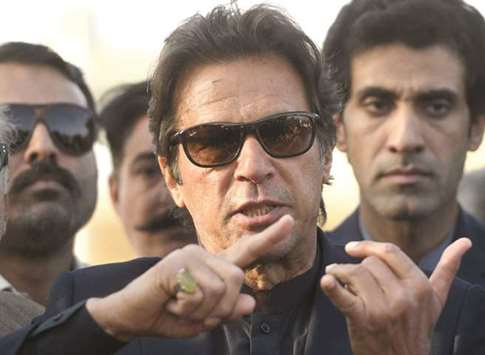Imran Khan’s Pakistan Tehrik-e-Insaf (PTI) will greenlight national and provincial assembly candidates for the upcoming elections at a meeting of the party’s parliamentary board in the first week of April.
A senior party leader confirmed yesterday that the party meeting will include the provincial heads of Sindh, Baluchistan and Khyber Pakhtunkhwa, and the four regional heads in Punjab to review expected candidates in various constituencies.
“It will be the first consultation meeting, as the party wanted to announce its candidates before the announcement of the general election schedule, out of fear that local leaders could join other political parties,” he said.
The party leader added: “There are many issues in Punjab, especially north Punjab areas where the local party chapters are divided into groups and people started lobbying within the party to get a party ticket for their group’s men.”
He said that the party had set criteria to conduct candidates for party tickets who performed well in the 2013 elections.
“For National Assembly constituencies, candidates who got 40,000 votes in the last elections will be considered, while candidates who got 25,000 votes will be considered for the provincial assemblies,” he said.
However, the PTI is in a difficult situation in Rawalpindi and Islamabad.
Islamabad has been divided into three constituencies, and the party will have to field a new candidate for the third National Assembly seat.
In Rawalpindi, he said, Awami Muslim League president Sheikh Rashid Ahmed has informed the party that he will contest two seats, while PTI legislator Ghulam Sardar is also interested in contesting two seats.
“Imran Khan, who was elected from Rawalpindi’s electoral constituency NA-56 in 2013, will likely contest from the cantonment areas for two reasons: Sheikh Rasheed wants to contest from two seats falling in the city areas, and also because PTI’s former candidate from the cantonment areas, Hina Manzoor, had left the party due to differences created during the PTI sit-in in 2014,” he said.
Local leaders in Jhelum and Sargodha are divided into the groups, and if the party favours one group the other may leave and join Nawaz Sharif’s Pakistan Muslim League – Nawaz (PML-N), the PTI leader said.
Murtaza Satti, formerly from Bilawal Bhutto’s Pakistan Peoples Party (PPP), was a potential candidate in Murree, he added, but old guard favour Sadaqat Abbasi, who also ran in 2013.
In Gujar Khan too, he said PTI was divided into two groups: the newcomers and the old guard.
“In such rural areas, the politicians are waiting for the announcement of candidates so they will set their directions in other parties,” he said.
When contacted, PTI spokesperson Naeemul Haq confirmed that party leaders would meet chairman Imran Khan in Banigala to decide on the candidates for the general election.
He said that lists had been made, and the meeting would finalise some constituencies but not all of them.
Haq said the party is working to finalise the names for National Assembly constituencies first.
He added: “We will discuss the issues of the general election and the problems of candidates, especially the delimitation of the constituencies, as many leaders have objected to [that].”
Party leader Asad Umer said the meeting was previously scheduled for March 25, then changed to April.
“The decision on party candidates in Islamabad will be announced, while others will be announced later,” he added.
Party legislator Ijaz Jazi said local chapters would not participate in the meeting but would present the constituency’s delimitation issue through the regional presidents.
He said the party had been informed of the changes in the constituencies, which would cause problems in choosing candidates and managing the constituency.
Jazi also said there were no differences within the party, and it would consider those who had participated in the 2013 elections and performed well.
Another legislator, Arif Abbasi, also said the party was focused on the delimitation of constituencies, adding that the party had formed an elections cell to listen to expected candidates’ problems with the delimitation issue, which will also present its report at the meeting.

Khan: was elected from Rawalpindi’s electoral constituency NA-56 in 2013.
